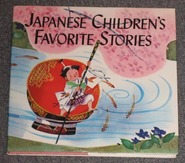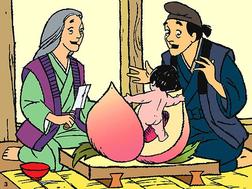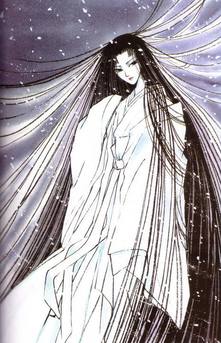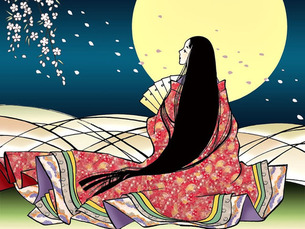FOLKLORE
Folktales

Like in most cultures, Japanese folklore has survived history through the oral tradition of storytelling. As is with most oral traditions, tales have disappeared an become lost as storytelling has become increasingly scarce. But in spite of this, there remains a vast collection of folktales that have been printed and preserved in books, especially in more recent years. Although minwa is the direct translation of folktale in Japanese, Mukashibanashi, a term coined by Kunio Yanagita and means "tales of long ago," is typically used to describe folktales of all types.
Momotaro (Peach Boy)

The discovery of Momotaro
One of the more popular folktales of Japanese tradition, Momotaro is a story about its titular character, Momotaro, whose name literally translates to "Peach Taro" or "Peach Boy." According to the most common form of this tale, an old woman was washing her clothes by the river when she came upon a giant peach that was flowing with the current. She brought it back home for her husband and her to eat, but upon opening the peach, they discovered a child. This boy told the elderly couple he had been sent by the Heavens to be their son, since the two were childless. And with that, he was dubbed Momotaro. The man and woman took good care of Momotaro and he became a strong boy--later the strongest boy in the village.
Several years passed and one day, Momotaro decided to test his strength by stealing treasure from an island full of devils. After discussing it with his parents, he convinced them to make him their best millet dumplings and with some preparation, he set off for the island.
As Momotaro set off on his journey, a dog joined him and asked, "Momotaro! What have you got there hanging at your belt ?" Momotaro replied and told the dog, "I have some of the very best Japanese millet dumplings," to which the dog then said, "Give me one and I will go with you," said the dog. So, he took a dumpling, gave it to the dog, and continued. Later on the way, he was approached by a monkey and a pheasant, both of which asked him similar questions, and received dumplings in similar fashions.
The three traveled along and soon arrived at the island of the devils and with the help of the pheasant, broke through the front gate. They encountered multitude of devils and had to fight them to get through, but because of the dumplings they had consumed, they were able to overpower the devils. The pheasant pecked at them, the dog bit them, and the monkey scratched them, thereby allowing them to make their way to the chief of the devils, Akandoji. The two fought and grappled with one another, but Momotaro was able to beat Akandoji with ease. Recognizing his defeat, Akandoji surrendered his treasure to the boy. Upon returning back to the village, Momotaro told stories about his adventure over a feast, attributing his success largely to the three animals. Then, with his riches, he later become a man of influence and wealth.
Several years passed and one day, Momotaro decided to test his strength by stealing treasure from an island full of devils. After discussing it with his parents, he convinced them to make him their best millet dumplings and with some preparation, he set off for the island.
As Momotaro set off on his journey, a dog joined him and asked, "Momotaro! What have you got there hanging at your belt ?" Momotaro replied and told the dog, "I have some of the very best Japanese millet dumplings," to which the dog then said, "Give me one and I will go with you," said the dog. So, he took a dumpling, gave it to the dog, and continued. Later on the way, he was approached by a monkey and a pheasant, both of which asked him similar questions, and received dumplings in similar fashions.
The three traveled along and soon arrived at the island of the devils and with the help of the pheasant, broke through the front gate. They encountered multitude of devils and had to fight them to get through, but because of the dumplings they had consumed, they were able to overpower the devils. The pheasant pecked at them, the dog bit them, and the monkey scratched them, thereby allowing them to make their way to the chief of the devils, Akandoji. The two fought and grappled with one another, but Momotaro was able to beat Akandoji with ease. Recognizing his defeat, Akandoji surrendered his treasure to the boy. Upon returning back to the village, Momotaro told stories about his adventure over a feast, attributing his success largely to the three animals. Then, with his riches, he later become a man of influence and wealth.
Yuki-onna

Yuki-onna, depicted in manga
Yuki-onna, or 'snow woman' is a yokai and a popular figure in many Japanese folktales. Described as a tall, beautiful woman with long black hair and blue lips, Yuki-onna is infamous for her cold and inhuman beauty. Like her name suggests, Yuki-onna is associated with the snow and winter, and it is commonly thought that she is the spirit of a woman who perished in a snowstorm.
Although stories of Yuki-onna vary from tale to tale, there are a few reoccurring themes amongst them. Typically, Yuki-onna only appears to travelers lost in a snowstorm. From there, she may kill her victims using several methods, such as using her icy breath to freeze them or leading them astray in the storm so they die of exposure to the elements. In other stories, Yuki-onna plays a more aggressive role--invading into homes with a gust of wind and killing the residents in their sleep.
However, in spite of her seemingly evil nature, there are some tales that depict a kinder side of Yuki-onna. One example is Lafcadio Hearn's (known by his Japanese name as Koizumi Yakano) version of the tale.
Long ago, there lived two woodcutters--Mosaku, who was an old man, and Minokichi, his eighteen year old apprentice. One winter day, they got trapped outside in a snowstorm and were forced to sleep in a hut on the mountain. Mosaku fell asleep quickly, but Minokichi lay awake for a long time until he too, eventually succumbed to sleep. Minokichi was awoken later by spray of snow upon his face. He saw a beautiful lady dressed in white, who was bended over and breathing upon Mosaku. Immediately afterwards, she turned and stooped over Minokichi. She stared at him for a long time, but then she smiled and whispered, "I intended to kill you like the other man. But I cannot help feeling some pity for you, because you are so young and beautiful, so I will not hurt you. But, if you ever tell anybody about what you have seen this night, I shall know it; and then I will kill you!" And with that, she disappeared.
Many years later, Minokichi met a beautiful young woman named O-yuki. They married, had several children together, and lived happily for many years. However, even as time passed, O-yuki never aged and remained as young as the day Minokichi met her. One night, Minokichi told his wife, "To see you makes me think of a strange thing that happened when I was a lad of eighteen. I then saw somebody as beautiful and white as you are now..." He then explained to her what happened that night several years ago, ending his story by concluding, "Indeed, I have never been sure whether it was a dream that I saw, or Yuki-onna." With this, O-yuki burst out angrily. "It was I! And I told you then that I would kill you if you ever said one word about it! And if it weren't for those children asleep there, I would kill you this moment! So now you had better take very, very good care of them!" After she finished screaming, she melted into a white mist and disappeared. No one ever saw her again.
Although stories of Yuki-onna vary from tale to tale, there are a few reoccurring themes amongst them. Typically, Yuki-onna only appears to travelers lost in a snowstorm. From there, she may kill her victims using several methods, such as using her icy breath to freeze them or leading them astray in the storm so they die of exposure to the elements. In other stories, Yuki-onna plays a more aggressive role--invading into homes with a gust of wind and killing the residents in their sleep.
However, in spite of her seemingly evil nature, there are some tales that depict a kinder side of Yuki-onna. One example is Lafcadio Hearn's (known by his Japanese name as Koizumi Yakano) version of the tale.
Long ago, there lived two woodcutters--Mosaku, who was an old man, and Minokichi, his eighteen year old apprentice. One winter day, they got trapped outside in a snowstorm and were forced to sleep in a hut on the mountain. Mosaku fell asleep quickly, but Minokichi lay awake for a long time until he too, eventually succumbed to sleep. Minokichi was awoken later by spray of snow upon his face. He saw a beautiful lady dressed in white, who was bended over and breathing upon Mosaku. Immediately afterwards, she turned and stooped over Minokichi. She stared at him for a long time, but then she smiled and whispered, "I intended to kill you like the other man. But I cannot help feeling some pity for you, because you are so young and beautiful, so I will not hurt you. But, if you ever tell anybody about what you have seen this night, I shall know it; and then I will kill you!" And with that, she disappeared.
Many years later, Minokichi met a beautiful young woman named O-yuki. They married, had several children together, and lived happily for many years. However, even as time passed, O-yuki never aged and remained as young as the day Minokichi met her. One night, Minokichi told his wife, "To see you makes me think of a strange thing that happened when I was a lad of eighteen. I then saw somebody as beautiful and white as you are now..." He then explained to her what happened that night several years ago, ending his story by concluding, "Indeed, I have never been sure whether it was a dream that I saw, or Yuki-onna." With this, O-yuki burst out angrily. "It was I! And I told you then that I would kill you if you ever said one word about it! And if it weren't for those children asleep there, I would kill you this moment! So now you had better take very, very good care of them!" After she finished screaming, she melted into a white mist and disappeared. No one ever saw her again.
The Tale of the Bamboo Cutter (Princess Kaguya)

The beautiful Kaguya-hime
The Tale of the Bamboo Cutter, also known as Princess Kaguya, is considered the oldest Japanese narrative in existence. The tale goes as follows.
One day, an old bamboo cutter was walking through a bamboo forest and came across a shining stalk of bamboo. He cut it open and found inside it a baby the size of his thumb. Since he and his wife were childless, he rejoiced and brought her back home, where they raised her as their own child and named her Kaguya-hime. From then on, the bamboo cutter found that whenever he cut down a stalk of bamboo, inside would be a small nugget of gold and soon, he grew rich.
Meanwhile, Kaguya-hime grew into an extraordinarily beautiful woman. News of her beauty spread far and wide, and eventually, five princes came to ask for her hand in marriage. In response, she created impossible tasks for the princes, telling them that she would marry the one who managed to fulfill his specific task. The first prince was told to fetch a sacred bowl of the Buddha in India, the second a jeweled branch from the island of Horai, the third the legendary robe of the fire-rat in China, the fourth a gem from a dragon's neck, and the fifth a special cowrie from the swallows.
The first prince realized it was an impossible task, so he returned with an expensive bowl. However, Kaguya-hime saw through his deception. The second and third princes also tried to trick her with fakes. but failed. The fourth gave up and the final prince lost his life while trying. After hearing of these incidents, Mikado, the Emperor of Japan, decided to visit Kaguya-hime and see with his own eyes, her unearthly beauty. He fell in love with her at first sight and asked her to marry him. Though he was not forced to perform the impossible tasks the other princes had to undergo, Kaguya-hime rejected his proposal, telling him that she was not of his country and thus could not go to the palace with him.
At the same time, during that summer, whenever Kaguya-hime saw the full moon, her eyes would well with tears. Her increasingly strange behavior worried her parents greatly. It got to the point that Kagyua-hime revealed to them that she was not of their world. Rather, she was the moon and her sad mood was because of the fact that she would have to return to her people on a designated date. As that day drew nearer, the Emperor sent guards around her house to protect her, but it was to no avail. A group of "Heavenly Beings" arrived at her house and blinded the guards with a strange light. With this, Kaguya-hime announced to everyone that though she loved many people on Earth, she had to return to her true home. She wrote a letter to the Emperor, attached a small taste of the elixir of life on the Emperor's letter, and then gave it to a guard to give to them. As she handed the letters to him, a feather robe was placed on her shoulders and with that, all of her compassion and sadness she had for the people of Earth left her.
After her departure, the guard delivered the letter to the Emperor and explained what had happened to him. Upon hearing the news, the Emperor ordered his men to take the letter to the mountain that was closest to the heavens and burn it, in hopes that the message would reach her. The Emperor also commanded his troops to burn the elixir of immortality, since he had no desire of living forever without her. Legend says that the word "immortality," or fuji in Japanese, became the name of the mountain, Mount Fuji.
One day, an old bamboo cutter was walking through a bamboo forest and came across a shining stalk of bamboo. He cut it open and found inside it a baby the size of his thumb. Since he and his wife were childless, he rejoiced and brought her back home, where they raised her as their own child and named her Kaguya-hime. From then on, the bamboo cutter found that whenever he cut down a stalk of bamboo, inside would be a small nugget of gold and soon, he grew rich.
Meanwhile, Kaguya-hime grew into an extraordinarily beautiful woman. News of her beauty spread far and wide, and eventually, five princes came to ask for her hand in marriage. In response, she created impossible tasks for the princes, telling them that she would marry the one who managed to fulfill his specific task. The first prince was told to fetch a sacred bowl of the Buddha in India, the second a jeweled branch from the island of Horai, the third the legendary robe of the fire-rat in China, the fourth a gem from a dragon's neck, and the fifth a special cowrie from the swallows.
The first prince realized it was an impossible task, so he returned with an expensive bowl. However, Kaguya-hime saw through his deception. The second and third princes also tried to trick her with fakes. but failed. The fourth gave up and the final prince lost his life while trying. After hearing of these incidents, Mikado, the Emperor of Japan, decided to visit Kaguya-hime and see with his own eyes, her unearthly beauty. He fell in love with her at first sight and asked her to marry him. Though he was not forced to perform the impossible tasks the other princes had to undergo, Kaguya-hime rejected his proposal, telling him that she was not of his country and thus could not go to the palace with him.
At the same time, during that summer, whenever Kaguya-hime saw the full moon, her eyes would well with tears. Her increasingly strange behavior worried her parents greatly. It got to the point that Kagyua-hime revealed to them that she was not of their world. Rather, she was the moon and her sad mood was because of the fact that she would have to return to her people on a designated date. As that day drew nearer, the Emperor sent guards around her house to protect her, but it was to no avail. A group of "Heavenly Beings" arrived at her house and blinded the guards with a strange light. With this, Kaguya-hime announced to everyone that though she loved many people on Earth, she had to return to her true home. She wrote a letter to the Emperor, attached a small taste of the elixir of life on the Emperor's letter, and then gave it to a guard to give to them. As she handed the letters to him, a feather robe was placed on her shoulders and with that, all of her compassion and sadness she had for the people of Earth left her.
After her departure, the guard delivered the letter to the Emperor and explained what had happened to him. Upon hearing the news, the Emperor ordered his men to take the letter to the mountain that was closest to the heavens and burn it, in hopes that the message would reach her. The Emperor also commanded his troops to burn the elixir of immortality, since he had no desire of living forever without her. Legend says that the word "immortality," or fuji in Japanese, became the name of the mountain, Mount Fuji.

